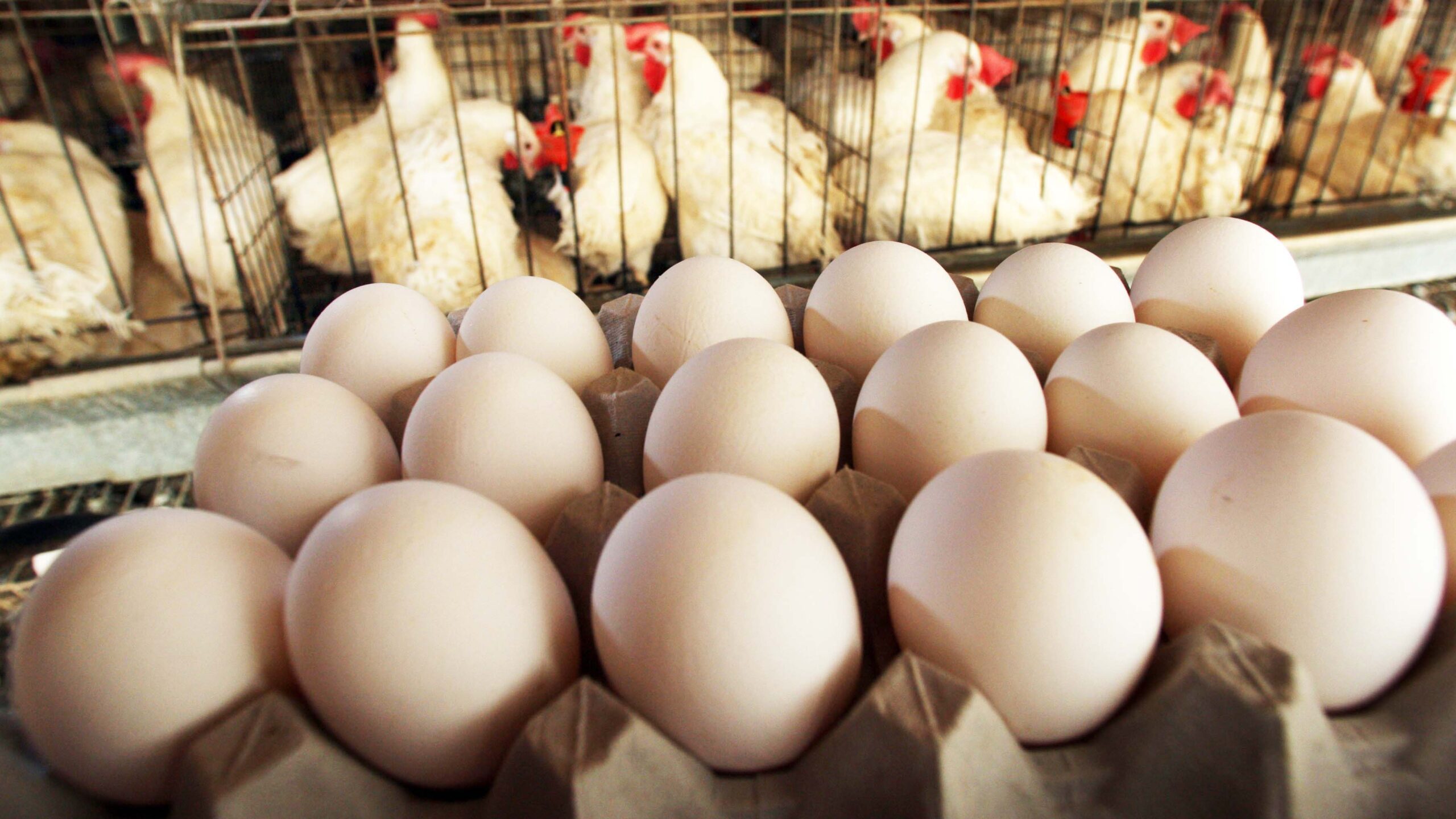Agriculture
PAN attributes eggs scarcity to low productivity output

The Poultry Association of Nigeria (PAN) has attributed the current scarcity of eggs and rising costs of poultry production to reduced productivity in the sector.
The Chairman of PAN in Lagos State, Mr Godwin Egbebe, disclosed this to newsmen on Thursday.
Egbebe said that due to the harsh realities being faced in the sector, a lot of farms had been forced to close down which resulted in a low supply of the product.
According to him, the scarcity of eggs and the rising cost of the product is not far-fetched as many poultry farms have closed and many are about to fold up.
“The high cost of farm inputs and feed meal materials are very expensive due to a potpourri of issues in the agriculture sector.
“Crop farmers have always complained about insecurity issues which in turn resulted in increasing their costs of cultivation and these costs are also factored in the cost of raw materials we need to produce poultry feed.
“Now that demand is higher than supply because of the closing up of more poultry farms, we are not producing as much as we should,” Egbebe said.
The PAN chair also noted that egg glut (a situation of excess egg production) was now a thing of the past in the sector following the issues being faced.
He called for government intervention to genuine farmers in the sector to address the inadequacies inherent.
“Egg glut is technically over in Nigeria because of the scarcity of eggs to meet the growing demands.
“We must tackle the issues surrounding the procurement of raw materials and farm inputs if we want an end to increasing prices of poultry produce and scarcity of eggs.
“The government can intervene in the poultry sector by pumping in necessary financial help to ease production costs,” he said.
Read Also: Over 400 poultry farms shut down in Katsina over insecurity
Egbebe said that interventions would help farmers that are closing up if it was done directly to them and not to pseudo or political farmers.
“Genuine farmers should be given bailouts by the government and this should go through the Poultry Associations because we can know our members.
“Sometimes it is baffling to hear that billions of Naira has been pumped into the sector, yet it does not get to us,” he said.
He said that farmers should see the direct impact of the government’s funding on the sector, and people should be held accountable.
“The scarcity of eggs and the subsequent increasing price cannot get better until things improve in the sector,” he said.
NAN reports that the cost of a crate of eggs at the farm gate goes as high as N2,000 per crate and between N2,300 to N2,500 at the retail price
(NAN)
PAN attributes eggs scarcity to low productivity output
Agriculture
Fintiri Unleashes N2bn Boost for Farmers as Adamawa Rolls Out 2025 Agricultural Support Programme

The Adamawa State Government has launched the 2025 Agricultural Support Programme aimed at empowering smallholder farmers and enhancing food security across the state.
Commissioner for Agriculture, Prof. David Jatau, disclosed this on Friday while briefing journalists in Yola. He revealed that Governor Ahmadu Umaru Fintiri had approved a substantial N2 billion for the initiative, which targets increased agricultural productivity in the upcoming farming season.
According to Jatau, the programme—which is already underway—will provide subsidised agricultural inputs such as fertilisers, improved seeds, and other essential materials to farmers in six local government areas.
“The programme has already commenced in six LGAs—Madagali, Michika, Hong, Maiha, Demsa, and Ganye,” he said. “By next year, during the rainy season, we will extend the programme to the remaining LGAs.”
He explained that 300 hectares of farmland would be cultivated in each of the participating local governments, with 300 farmers benefitting per council.
To ensure fairness and transparency, Jatau said a multi-stakeholder committee had been constituted to oversee the beneficiary selection process. The committee comprises representatives of traditional councils, local government authorities, security agencies, youth groups, and women organisations.
“We are also equipping extension workers with training to offer farmers guidance on modern agricultural techniques for improved yield,” he added.
The commissioner noted that the intervention would not only increase food production but also generate employment, improve rural incomes, and contribute to economic stability in farming communities.
Jatau also revealed that the state government is collaborating with non-governmental organisations and agricultural development bodies, with over 2,700 hectares of farmland pledged by development partners for cultivation.
He reaffirmed the Fintiri administration’s commitment to achieving food self-sufficiency and urged beneficiaries to make the most of the programme.
Agriculture
KWASU Microfinance Bank disburses loan to farmers

The Kwara State University (KWASU) Microfinance Bank has provided loan facilities to farmer groups in and around Malete, Moro Local Government Area.
The Vice-Chancellor and Chairman of the Board of Trustees, KWASU Microfinance Bank, Prof. Jimoh Shaykh-Luqman, announced this while presenting offer letters to the farmers’ associations at a formal event held on the university campus.
Addressing the farmers, the Vice-Chancellor, represented by the Deputy Vice-Chancellor (Administration), Prof. Moshood Jimba, said the agricultural loan scheme aimed to support farmers in boosting food production and enhancing food sustainability.
“The loan is meant to support your farm operations, especially in the upcoming planting season,” he said.
Prof. Shaykh-Luqman reaffirmed KWASU’s commitment to its mantra of being a “University for Community Development,” leveraging its expertise and resources to initiate programmes that drive local development.
The Managing Director and Chief Executive Officer of KWASU Microfinance Bank, Alhaji Hakeem Hassan, noted that the agricultural loan scheme was piloted last year with 15 farmers as beneficiaries.
He added that the pilot scheme yielded positive results for both the farmers and the bank, as all beneficiaries successfully repaid their loans.
Following this success, he said, the scheme had been expanded to include more farmers under various farmers’ associations.
The News Agency of Nigeria (NAN) reports that the associations benefiting from the agricultural loan scheme include Alanu Agbelere Farmers Group, Agbedola Ketere Group, and Itesiwaju Agbe Group Omoni.
Others are Agbeloba Farmers Association (Malete Market), Agbeyewa Elemere Farmers Group, Agbe Olofeere Group, and Agbeloga Malete Farmers Group.
Speaking on behalf of the farmers, the Chairman of Agbeloba Farmers Association (Malete Market), Alhaji Mohammed Abdulrazaq, expressed gratitude to the university and the bank for their trust.
He pledged, on behalf of the beneficiaries, to utilise the loans effectively and ensure prompt repayment.
Agriculture
Kano Govt. implements N2.3bn livestock empowerment programme

The Kano State Government has begun implementing the second phase of its livestock empowerment programme valued at N2.3bn under the Kano State Agro-Pastoral Development Project (KSADP).
The Commissioner for Agriculture and Natural Resources, Dr Mamood Danjuma, disclosed this while addressing newsmen on Thursday in Kano.
Danjuma said the initiative aims to support beneficiaries with livestock, feeds, drugs, and salt lick to enhance their economic well-being.
According to him, 911 beneficiaries are being supported with two rams each, feed for three months, drugs and salt lick, while 2,386 women are being supported with two goats and a buck goat in the poorest households in the state.
He explained that the total package under the empowerment programme showed that 1,342 bulls were procured by the government at the cost of N560m, 1,822 rams were procured at the cost of N175m and 7,158 goats bought at the cost of N451m.
“Under the cattle scheme, each cattle gains 100kg over a period of 120 days. The fattening period is for 120 days, making three cycles possible in a year.
“As for the small ruminants fattening scheme, with the same 120-day fattening period yielding an extra 15kg/animal.
“The project promotes goats’ reproduction through women who will take care of the animals and sell the young ones to improve their income and standard of living,” he said.
He said that the programme promotes economic empowerment, particularly among women, by providing them with livestock to care for and sell, ultimately improving their income and standard of living.
-

 Headlines4 years ago
Headlines4 years agoFacebook, Instagram Temporarily Allow Posts on Ukraine War Calling for Violence Against Invading Russians or Putin’s Death
-

 Headlines4 years ago
Headlines4 years agoNigeria, Other West African Countries Facing Worst Food Crisis in 10 Years, Aid Groups Say
-

 Foreign4 years ago
Foreign4 years agoNew York Consulate installs machines for 10-year passport
-

 News1 year ago
News1 year agoZero Trust Architecture in a Remote World: Securing the New Normal
-

 Entertainment3 years ago
Entertainment3 years agoPhyna emerges winner of Big Brother Naija Season 7
-

 Headlines2 years ago
Headlines2 years agoNigeria Customs modernisation project to check extortion of traders
-

 Entertainment2 years ago
Entertainment2 years agoMovie download platform, Netnaija, announces closure
-

 Economy2 years ago
Economy2 years agoWe generated N30.2 bn revenue in three months – Kano NCS Comptroller







